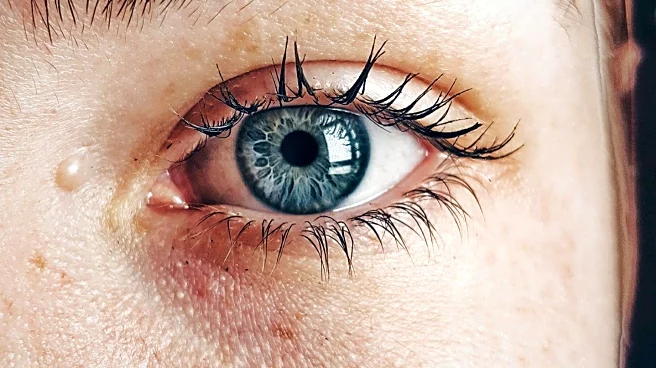What is the story about?
What's Happening?
Researchers at the University of Manchester are pioneering a study that uses tear fluid to identify glioblastoma, the most aggressive form of brain tumor. This innovative approach, described as a 'liquid biopsy,' aims to provide faster, cheaper, and less invasive diagnoses for brain cancer. The study is led by Prof Petra Hamerlik, who has personal experience with the disease, having lost her father to glioblastoma. The research is supported by nearly £500,000 in funding from Stand Up To Cancer, a joint campaign by Cancer Research UK and Channel 4. The team is developing a tear-protein-based classifier that can accurately differentiate between brain cancer patients and healthy individuals. If successful, this test could be implemented in GP surgeries, allowing for earlier diagnosis and improved patient outcomes.
Why It's Important?
The development of a tear-based test for brain cancer detection could significantly impact the healthcare industry by providing a non-invasive, cost-effective method for early diagnosis. This advancement has the potential to improve survival rates and quality of life for patients by enabling timely treatment interventions. The research could also reduce the burden on healthcare systems by minimizing the need for more invasive and expensive diagnostic procedures. Patients like Alex Davies, who is participating in the study, highlight the personal and societal benefits of such innovations, offering hope for those affected by brain tumors. The success of this test could pave the way for similar diagnostic tools for other types of cancer, revolutionizing cancer detection and treatment.
What's Next?
If the tear-based test proves successful, researchers plan to seek additional funding to develop a tool that can be rapidly deployed across health services. This would involve larger-scale trials to validate the test's accuracy and effectiveness in diverse populations. The potential rollout in GP surgeries could transform the standard approach to brain cancer diagnosis, making it more accessible and less daunting for patients. Stakeholders, including healthcare providers and policymakers, may need to consider the integration of this technology into existing diagnostic protocols and address any regulatory or ethical concerns. The study's progress will be closely monitored by the medical community, with anticipation for its broader application in cancer diagnostics.
Beyond the Headlines
The tear-based test for brain cancer detection raises important ethical and cultural considerations. The use of bodily fluids for medical testing can evoke privacy concerns and necessitate discussions about consent and data protection. Additionally, the cultural acceptance of such diagnostic methods may vary, requiring public education and awareness campaigns to ensure widespread adoption. Long-term, this research could influence the development of personalized medicine approaches, where treatments are tailored based on individual genetic and biological markers. The success of this study could also inspire further exploration into non-invasive diagnostic techniques, potentially leading to breakthroughs in other areas of medicine.

















